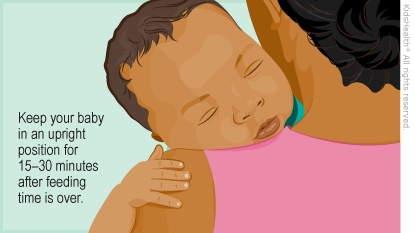It's normal for babies to spit up. This can happen right after feeding or a while later, often with a burp. As babies grow, they usually spit up less often.



Your baby:

Your baby throws up blood or bile (a green or yellow liquid).

Why does my baby spit up? Spitting up is a normal part of being a baby. The muscles in a baby's esophagus (the "food pipe" that connects the mouth to the stomach) are still developing. They're not strong enough to always keep food down. Food can flow back up into the baby's mouth or nose after eating or with a burp.
Does my baby need medicine to treat the spitting up? No. Spitting up isn't painful and your baby is growing well, so medicine isn't needed. Your baby will probably stop spitting up by the time they turn 1.